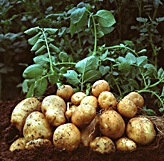
Features
Fruit
Production
BASF set to cultivate GMO potatoes in 2011
February 9, 2011 By Fruit & Vegetable
 February 2, 2011, Limburgerhof, Germany – BASF Plant Science
February 2, 2011, Limburgerhof, Germany – BASF Plant Science
has concluded its Amflora cultivation plans for the 2011 season.
February 2, 2011, Limburgerhof, Germany – BASF Plant Science
has concluded its Amflora cultivation plans for the 2011 season.
Amflora, the genetically enhanced potato for use in the
starch industry, will this year be cultivated on two hectares of land in
Üplingen (Saxony-Anhalt, Germany).
 |
|
“There are many good reasons for the use of Amflora in
Germany, which after all is renowned for growing starch potatoes,” says Peter
Eckes, managing director of BASF Plant Science. “Separating the starch
components in conventional potatoes for industrial use is not cost-effective or
environmentally sound. Amflora is an innovative new variety that produces pure
amylopectin starch. It therefore helps to cut down on resources, energy and
costs and offers farmers and the starch processing industry real added
value."
In addition to Germany, BASF Plant Science will again be
planting out Amflora in Sweden during the 2011 season. After receiving approval
from the authorities for the majority of the Amflora seed stock, BASF Plant
Science is concentrating on propagating seed stock for cultivation in
subsequent years. BASF is performing very strict internal quality checks for
this purpose and is only using the best quality seed stock.
Amflora is a genetically modified potato variety which
produces pure amylopectin starch. Conventional potatoes produce a mixture of
amylopectin and amylose starch. In many potato starch applications, for example
in the paper, adhesive and food industries, only amylopectin is needed, but
separating the two starch components is uneconomical. Amflora produces pure
amylopectin starch and thus helps to save resources, energy and costs.
Moreover, paper manufactured with amylopectin starch has greater tear resistance,
and the addition of amylopectin to concrete and adhesives gives them a longer
pot life. In the case of Amflora, BASF Plant Science and its partners in the
starch industry decided to focus on industrial applications.
Print this page